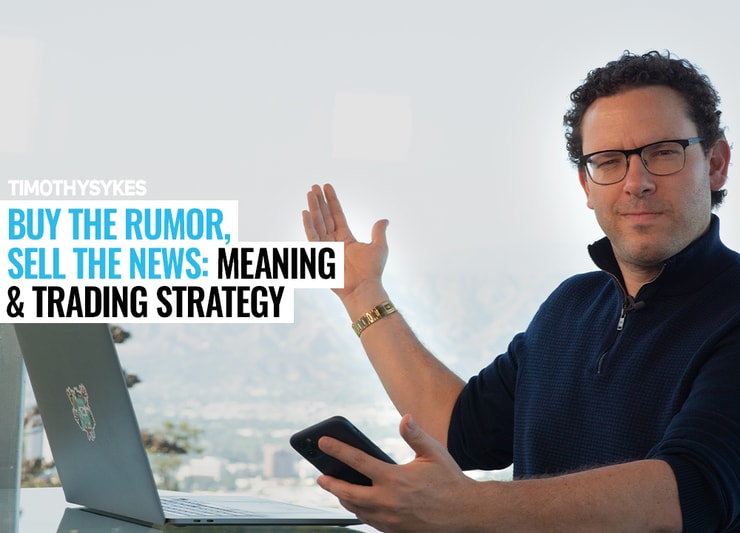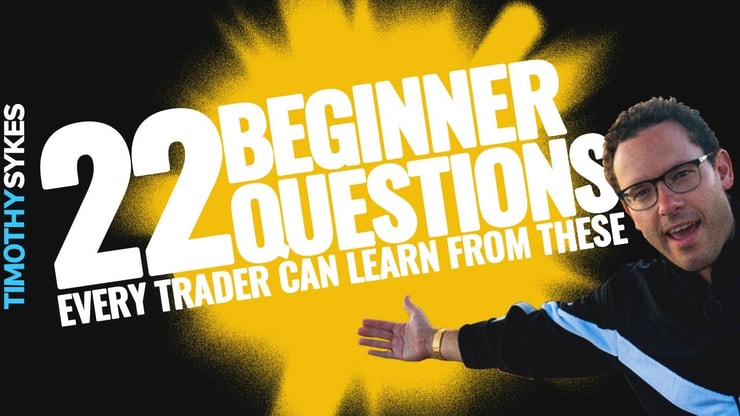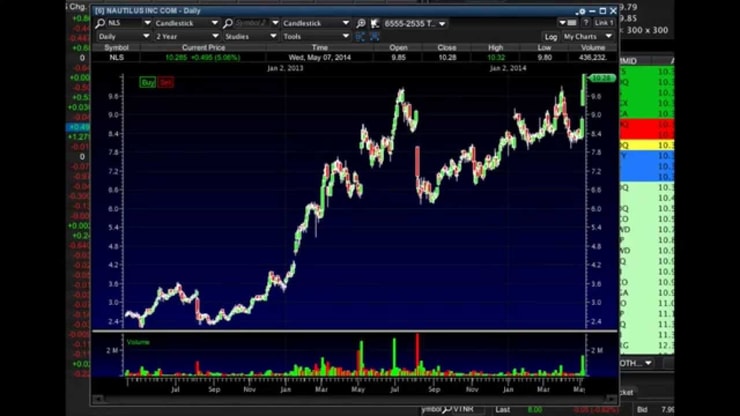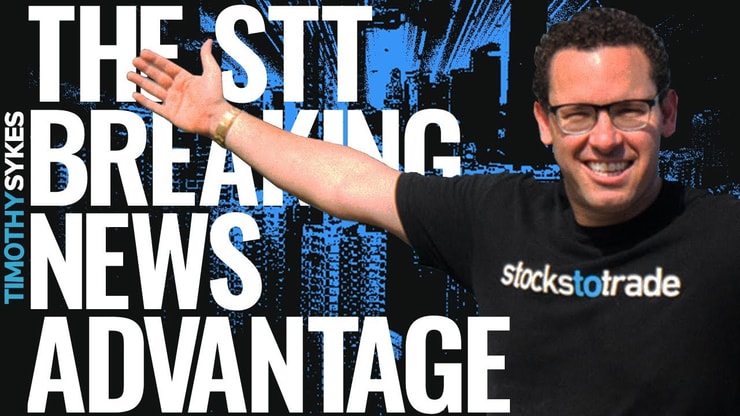‘Buy the rumor, sell the news’ — it’s a common refrain in the stock market. But what does it actually mean?
Well, there’s this crazy thing that happens in the stock market…
Speculation and stock rumors can create huge price spikes. In fact, sometimes these spikes are even bigger than if there’s a catalyst with real substance.
I know. It sounds crazy. But here’s something every trader needs to understand — the stock market is not rational.
I’m not saying this to scare anyone. But I am putting a warning out there. Traders need to be in the right mindset and understand the penny stock game before they start to trade…
Let’s talk about how the ‘buy the rumor, sell the news’ phenomenon plays out in the stock market … and how traders can potentially use it to their advantage.
Table of Contents
- 1 ‘Buy the Rumor, Sell the News’: What Does It Mean?
- 2 Penny Stock Example of ‘Buy the Rumor, Sell the News’
- 3 History Doesn’t Repeat Itself, But It Often Rhymes
- 4 ‘Buy the Rumor, Sell the News’ Trading Strategy
- 5 Frequently Asked Questions About ‘Buy the Rumor, Sell the News’
- 6 ‘Buy the Rumor, Sell the News’ — The Bottom Line
‘Buy the Rumor, Sell the News’: What Does It Mean?

Let me tell you about two imaginary stocks.
Company A is an established company that just announced better-than-anticipated earnings.
Company B is a sketchy penny stock with a Reddit rumor about a big upcoming merger.
Take a guess … Which company’s stock do you think is more likely to spike?
On one hand, Company A is the obvious winner. It’s a real company with actual news.
But in reality, even good news sometimes fails to create spikes. Sometimes, a stock will even go down after a positive earnings report.
On the other hand, Company B sounds totally sketchy. A Reddit rumor shouldn’t be enough to move a stock price, right?
But it happens all the time. Company B could potentially have a huge spike … solely based on anticipation. ‘Buy the rumor, sell the news’ Reddit spikes are a thing. Same goes for Twitter, chat rooms, and more…
For traders who recognize these ‘buy the rumor, sell the news’ plays, spikes like this can create opportunities.
But be warned — those speculative spikes are usually short-lived. That’s part of why I prefer to trade rather than invest in penny stocks.
Obviously, this is a hypothetical and simplified example. But it represents a big theme in the penny stock world…
Penny Stock Example of ‘Buy the Rumor, Sell the News’
This is exactly the type of counterintuitive lesson I try to teach students in my Trading Challenge. Here’s a penny stock example of how ‘buy the rumor, sell the news’ works.
What Is ‘Buy the Rumor’?
On May 19, 2020, I saw that there was a rumor surrounding Microvision, Inc. (NASDAQ: MVIS) about a possible sale.
Seeing the opportunity, I entered the trade right away. I bought it at 95 cents just as the news was breaking. I had a goal to make 10%–20%.
I sold shortly after at $1.04 for a $2,250 profit.*
(*Please note: My results, along with the results of top traders, are far from typical. Individual results will vary. Most traders lose money. These top traders and I have the benefit of many years of hard work and dedication. Trading is inherently risky. Do your due diligence and never risk more than you can afford to lose.)
In a case like this, you might be wondering why I didn’t stay in the trade longer.
Why sell on good news? After all, the stock could spike even more as the news drops, right?
Not exactly…
Selling the News

Here’s the problem with buying into the news…
Once the news actually breaks, it usually goes stale pretty fast.
By the time the news breaks, seasoned traders are already getting out of the trade. They bought the rumor, then they sold into strength as a wave of newbies bought up shares.
With the MVIS trade I told you about, the price move was short-lived. The stock closed at $1.01, had a little bounce the next day, then faded. So all those newbies who bought into the stock quickly became bag holders.
Without history and knowledge, a lot of newbies fail to grasp this concept. So they buy into what they perceive as good news, then get burned.
I see it happen again and again.
It might seem like the stock market makes no sense when this happens. But that’s not the case. That’s just newbies making assumptions about the way the stock market should be versus following the rules.
Are you a new trader? Before you trade, get educated. My student Jamil’s book, “The Complete Penny Stock Course” is a great place to get familiar with the basics of my strategy.
Also, be sure to watch this video to get answers to common trading questions…
History Doesn’t Repeat Itself, But It Often Rhymes
Let’s go back in time to look at a large-scale example of ‘buy the rumor, sell the news.’
More Breaking News
- Arm Holdings’ Stock Surges: Opportunity or Overvalued Mirage?
- Is Recursion Pharmaceuticals’ Recent Regulatory Success a Major Investment Opportunity?
- Rezolve AI Unveils Bold Partnerships and Debt Conversion: Future Market Potential on the Rise?
China Deal Reaction
On October 11, 2019, there were whispers of a completed trade deal between the U.S. and China…
The S&P 500 had a huge morning spike. Then, that afternoon, something funny happened when the news was officially announced…
The markets had a sharp sell-off, closing at the day’s lows. The major indexes tanked.
In looking at the reaction, you might think, ‘Oh, the deal didn’t go through.’
Nope! There was an actual deal … The news was even better than people anticipated.
But the big players had already exited stage left. They bought the rumor in anticipation of the news. Then they sold to the newbies who bought the press release.
No, the next ‘buy the rumor, sell the news’ play won’t look EXACTLY like the SPY did with the U.S.-China trade deal announcement…
But this general pattern happens all the time in the stock market.
‘Buy the Rumor, Sell the News’ Trading Strategy
I hate seeing newbies blindly buy into news, only to get dumped on.
Stop making the same newbie mistakes. Don’t hold through the news … Ride the rumor and take your single.
To make sure you understand what I’m putting out there, here are some things traders need to know about the ‘buy the rumor, sell the news’ strategy…
#1 Take the Predictable Move
Hype can move stocks. I like to take advantage of it when it happens.
For instance, I’d buy a penny stock on rumors that they’re working with a big company like Google.
I understand that the anticipation of a deal can create more price action than the actual deal itself. So for me, the predictable move would be to buy in advance of the news.
But I probably wouldn’t hold it very long — very rarely overnight — because these rumors can get busted pretty easily.
Here’s another example of a situation where I’d sell before the news breaks…
Say a company makes an announcement stating something vague like, “We’re reporting earnings in three days at 4 p.m. Eastern time.”
The stock price could move in anticipation of the earnings. So I might buy in the period leading up to the announcement. But I’d never hold into the earnings.
You don’t want to be holding the stock when the announcement actually comes. Anything could happen.
#2 Think Ahead of the Newbies
A lot of traders — honestly, not just newbies — only look at one or two indicators, like good earnings or record growth.
For example, a company could have good earnings right now, but warn on their conference call:
“We had a record quarter, but a competitor just came out with a product, so next quarter is looking a little soft.”
Newbies who only looked at the earnings news think that they’re buying a great stock … Then it tanks 30%, and they don’t understand why.
They’re not looking at the big picture.
It’s important to think about little comments, forward-looking statements, and expectations because they can change the earnings reaction. It’s not just about record profits or the headlines right now. Put it all into perspective.
Curious about trading earnings winners? Check out this video. It’s a few years old, but the lessons still hold up…
#3 Think Differently
Most people would think it’s a smarter idea to hold off on rumors and wait until the news actually proves itself.
I know it’s counterintuitive, but I try to think differently.
For me, it’s not about investing in penny stock plays. It’s about reacting to spikes that are created by hype and rumors.
But I don’t want to wait around and see what’s going to happen once the news is actually announced — whether it’s a merger, a partnership, or earnings.
I just want to…
#4 Ride the Wave of Anticipation
I always tell traders to react rather than anticipate. So it might seem backward to say that I also like to ride the wave of anticipation.
But in reality, I’m not doing the anticipating myself. I’m reacting to the anticipation that’s drawing in traders and driving up demand for a stock.
I’m observing the stock spiking, so I jump in briefly and capture the meat of the move. Then I move on. I don’t need to wait around for the news.
So it’s still about reacting, not anticipating. But the general anticipation and hype that comes with rumors is something traders need to be aware of.
Here’s one of my favorite tools for finding potential ‘buy the rumor, sell the news’ plays:
Frequently Asked Questions About ‘Buy the Rumor, Sell the News’
Still have questions? Let’s dig in…
How Do You Find Stock Rumors?
You can find stock rumors all over the place. Twitter and Reddit are rampant with stock rumors. But personally, I like finding potential trades with StocksToTrade’s Breaking News Chat add-on. The Wall Street pros who run this chat room are quick to alert things like chat room pumps and rumors that can move stocks.
Who’s Buying When Everyone’s Selling Stock?
Usually, it’s newbies. More seasoned traders usually buy the rumor and then sell into strength while the newbies buy the news … Often, uneducated newbies get left holding the bag.
Is ‘Buy the Rumor, Sell the News’ Valid for Forex Trading?
I’m not a forex trader, but yes, some forex traders use the ‘buy the rumor, sell the news’ strategy. For instance, rumors about a country’s rising interest rates can be perceived as a sign of a strong economy. And that might attract forex buyers in anticipation of a rising currency rate.
‘Buy the Rumor, Sell the News’ — The Bottom Line

‘Buy the rumor, sell the news is stock market folklore for a reason.
Stocks can potentially experience big price spikes based on speculation and rumors. Often, these hype-fueled spikes outweigh the reaction to actual news.
It doesn’t make sense at first. But a lot of things in the stock market don’t make sense until you study, learn, and start to understand how trading really works.
The stock market is forward-thinking. Most people are trying to anticipate what will happen in the future.
I like to study the past and look for patterns. That helps me find ‘buy the rumor, sell the news’ plays that I can get in on and ride the wave of anticipation and hopefully generate profits.
Are you ready to shift your viewpoint and think differently? Consider applying for my Trading Challenge.
Have you ever traded a ‘buy the rumor, sell the news’ play? Did it work out, or were you burned? Leave a comment … I love hearing from you!









Leave a reply